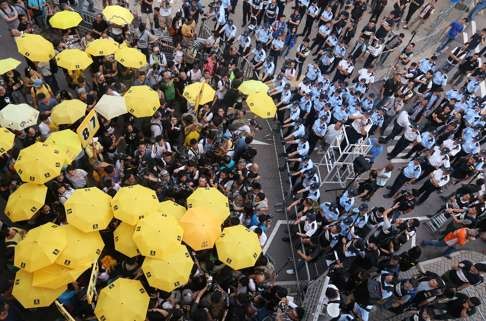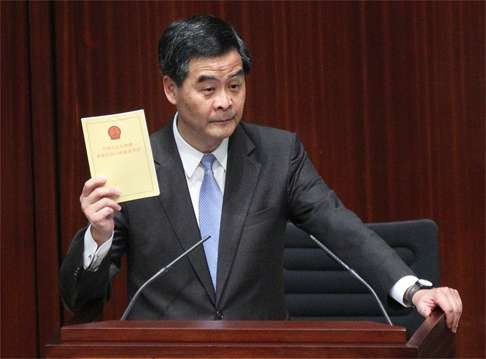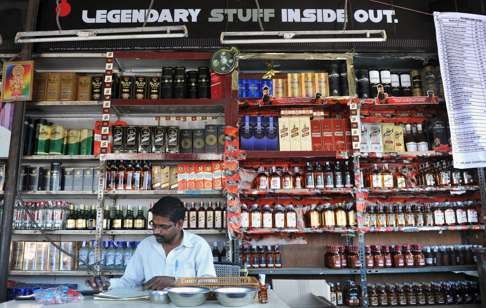
Democracy in Hong Kong must be advanced in stages
Fozia Lone says nothing in international law obliges the practice of universal suffrage, and further democratic development in the SAR is not possible without considering Chinese sensitivities and aspirations


Pro-democracy groups condemned the Standing Committee’s decision, claiming that such a selection mechanism was contrary to the international standards of “universal suffrage” and the right to participate in public life, which are enshrined in Article 25 of the International Covenant on Civil and Political Rights. They also said it went against the promises stipulated in the 1984 Sino-British Joint Declaration.
Following Occupy, many writers have discussed the issues of political reform, democracy and the future of “one country, two systems” in Hong Kong.

However, these discussions have been rather inadequate and, in certain cases, lopsided, as they naively viewed political development in Hong Kong through the prism of Article 26 (the right to vote) of the Basic Law only, forgetting that this document is an incarnation of the “one country, two systems” plan made between China and Britain.
The Chinese People’s Political Consultative Conference, in its first plenary session in 1949, adopted the Common Programme, the country’s de facto constitution for the next few years, and Article 3 stated, “The People’s Republic of China must abolish all the prerogatives of imperialist countries in China”.
Clearly, autonomy under this plan is not a decentralised right but is linked to a parallel duty to remain loyal to the motherland. The “one country, two systems” plan was incorporated in the Joint Declaration, a key part of the handover of Hong Kong, and was then domestically incorporated into the Basic Law (articles 1 and 2). Further, under Article 158, the right to interpret the Basic Law lies with the NPC Standing Committee.
Through Article 39 of the Basic Law and the Hong Kong Bill of Rights, the International Covenant on Civil and Political Rights is enshrined in Hong Kong law. The Basic Law promised steady, incremental promotion of democracy. Article 45 states that the chief executive will be “selected by election or through consultations held locally and be appointed by the Central People’s Government” and the method for selection “shall be specified in the light of the actual situation in the Hong Kong Special Administrative Region and in accordance with the principle of gradual and orderly progress”.
It further promised that the ultimate objective would be to select the chief executive by “universal suffrage upon nomination by a broadly representative nominating committee in accordance with democratic procedures”.

It was through the Basic Law that Hong Kong for the first time enjoyed any form of democracy. Prior to the handover, Hong Kong was ruled by Britain through its designated governors. The central government has, practically, fulfilled its promise and the chief executive elections have been increasingly democratic; the Election Committee has grown to 1,200 members, compared to the 400 members in the first chief executive election.
It must be noted that within international law, “universal suffrage” is not an entitlement. In fact, there is no democratic prerogative under international law that requires China to implement Article 25 of the International Covenant on Civil and Political Rights within Hong Kong. “Universal suffrage” is not a binding obligation for attaining internal self-governance; nor does it create a political right.
Since the 1990s, with the end of the cold war, attention has turned increasingly towards domestic governance. Democracy has permeated international law literature during decolonisation and aimed to prevent discrimination. For instance, Article 1 of the international covenant obliges member states to promote the internal right to self-determination of peoples. Article 25 calls for political participation, which is to be prescribed by national governments on the basis of their constitutional law.
In Hong Kong, the procedure for voting rights is determined by the Basic Law and falls within the internal competence of the central government. Hence, international law cannot be used to bully China to implement Article 25 within Hong Kong.

Further, democracy, as a Western political ideology, has not always been a success, as can be seen with the recent Middle East unrest. In Asian countries, such as India, Pakistan and Bangladesh, democracy is unfortunately not a success story, and there are myriad instances of vote-rigging, sectarian violence, corruption, human rights violations and the like.
The ipso facto implementation of Western-style democracy in a culturally and ideologically diverse society ends up creating hybrid demons. South Asia has a history of political assassinations and government being run as a “family business”. Votes can be bought from the poor for meagre meals. In my understanding, this “universal suffrage” is utter nonsense.
Democratic ideas cannot be sustained in underdeveloped states
China is developing fast and prioritising economic development. Democratic ideas cannot be sustained in underdeveloped states. Western nations, including the US and Britain, were not practising democracies with equal voting rights during their early stages of economic development.
Further democratic developments in Hong Kong are not possible without consideration of Chinese historical sensitivities and economic aspirations.
Undeniably, the contemporary Chinese position on Western international law is shaped by Chinese resentment over the two Opium wars, which forced it into accepting Western imperialism in the form of many unequal treaties, including one – the Treaty of Nanjing in 1842 – that ceded Hong Kong to Britain.
Today, China, which traditionally was a civilisational state, defines “sovereignty” in a way that allows it to defend its legitimacy and unity against any foreign interference.
Self-government is the prerogative of national governments and therefore responsible nations should refrain from using international law as justification to press China over Hong Kong.
I am hopeful that China will adopt a flexible policy over political reform in Hong Kong that will win the hearts and minds of people.
Dr Fozia Lone is an assistant professor in the School of Law at City University of Hong Kong